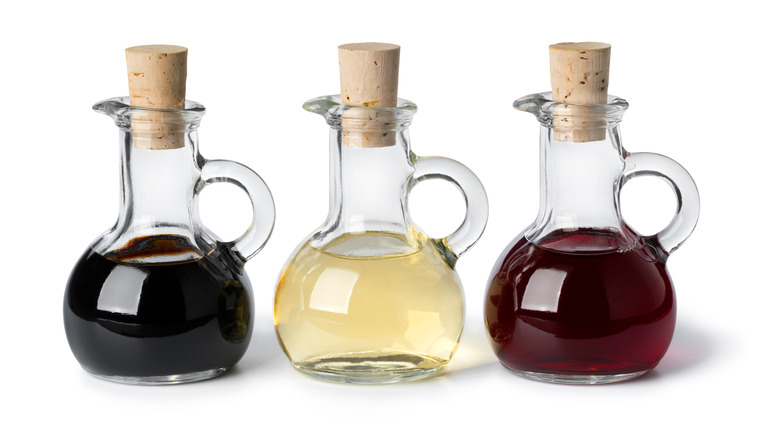Vinegar Was Originally Made With This Fruit
Humans and vinegar go way back. The acidic liquid dates as early as 5000 B.C. according to New World Encyclopedia, being mentioned in Babylonian scrolls, and traces of vinegar have been found in Egyptian urns from as early as 3000 B.C. The ingredient has been used for a wide variety of things both past and present, including pickling, cleaning, as medicine, and more.
Vinegar is always derived from something that contains sugar, as the fermentation process by which it is created cannot happen without the ingredient. In a setting starved for oxygen, yeast breaks down the sugar, creating alcohol in the form of ethanol and carbon dioxide. Then oxygen is reintroduced, allowing bacteria take a dive into the resulting liquid, converting it into what you would recognize as vinegar.
You can create vinegar with essentially any food containing sugar: apples, grapes, rice, you name it. And while the name vinegar literally means "sour wine," the grape was perhaps surprisingly not the fruit used to make the first recorded vinegar.
In ancient Babylon, date vinegar reined supreme
The oldest recorded mention of vinegar from those Bablynonian scrolls actually names palm dates as the fruit used in the fermentation process, per West Virginia University. This vinegar — made from the fruit or even the sap of the date palms, according to Supreme Vinegar – was used to help preserve food, which was especially important given the warm climate that would have caused food to spoil fairly quickly. Other civilizations soon had their own versions of vinegar as well, including Ancient Greek, Egyptian, and Chinese civilizations, all made from different ingredients.
Today, vinegar made from dates still is on the market, produced mostly in Iran, Iraq, and Saudi Arabia. Date vinegar distributors do exist in the United States, but other kinds of vinegar — like white or apple cider vinegar — are much easier to come by.
If you want to try this little piece of history but can't seem to find it, is it totally possible to make date vinegar yourself: Eating History recommends starting off with dates, sugar, distilled water, and a mother vinegar (which Revolution Fermentation explains is a film, similar to kombucha's scoby, that contains the bacteria needed to turn alcohol into acetic acid) to achieve your desired results.

